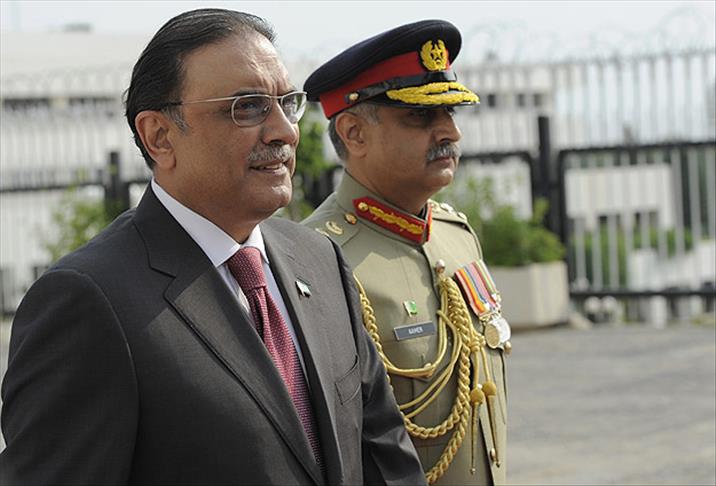Zardari completes presidential term; first time in Pakistan's history

ISLAMABAD
President Asif Ali Zardari is leaving office on Sunday after having served his five-year term, becoming the first ever democratically-elected president to complete his tenure in the 66-year history of this South Asian Muslim country.
"This is a historic moment in the political history ofPakistan when one democratically-elected president is completing his term and another president is replacing him through democracy rather than a coup or any other undemocratic means," Hameer Soomro, a Karachi-based political analyst, told Anadolu Agency.
President-elect Mamnoon Hussain is going to take the oath of his office on Monday as the 12th president of the Islamic Republic of Pakistan.
Hussain, a close confidant of Prime Minister Nawaz Sharif, was elected president with a thumping majority in the national parliament on August 6, defeating Wajihuddin Ahmed, a former Supreme Court judge and the candidate of Pakistan Tehrik-e-Insaf (PTI) of cricketer-turned-politician Imran Khan.
The former ruling party, the Pakistan People's Party (PPP), had boycotted the presidential vote.
Iskander Mirza, who became the first president ofPakistan in 1956, was deposed two years later in a military coup by General Ayub Khan.
Khan was forced to step down under pressure from the opposition, handing over power to General Yahya Khan, who resigned two years later after Pakistan lost its 1971 war against India.
Zulfikar Ali Bhutto, the PPP founder, was elected president in December 1971, but resigned two years later to serve as prime minister under the new constitution which established the government system in Pakistan as parliamentary.
Fazl Elahi Chaudry became president in 1973 and resigned in 1978, a few months after a military coup by then army chief General Zia-ul-Haq toppled the Bhutto government.
Zia died in a plane crash in 1988.
Ghulam Ishaq Khan was elected to office the same year. He resigned in 1993 under a deal brokered by the army following a political crisis with then prime minister Nawaz Sharif.
Farooq Leghari was elected president in 1993 but was forced to resign in 1997.
A few months later, Muhammad Rafiq Tarar was elected president. He resigned in 2001, two years after a military coup by General Pervez Musharraf.
Musharraf ruled Pakistan until 2008 when he stepped down to avoid impeachment.
- Democracy Rule
Out of 11 presidents, none had completed his term except President Zardari.
"Political parties have learnt a lot during the past decade, especially during a combined struggle against the regime of former military ruler General Pervez Musharraf," explains Soomro, the analyst.
The two major political parties – the PPP and Sharif'sPakistan Muslim League (PML) – signed in 2007 a Charter of Democracy, pledging not to destabilize any democratically-elected government through any undemocratic means in the future.
"Zardari's completion of his term is the result of that charter," Soomro insists.
"Despite all the political differences and turmoil during the PPP's stint in the country, Sharif stuck to his promise vis-à-vis completion of terms by democratically-elected governments," he noted.
"Now, it is Zardari’s turn to pay him (Sharif) back in the same coin," believes the expert.
Sharif, who is serving his third term as prime minister, has hosted a farewell reception in the honor of the outgoing president, a rare event in the political history of Pakistan.
"We will work together under your leadership for the betterment of the country. We will not do politics. We will do politics after five years when you will announce the election schedule," Zardari, who is also the co-chairman of PPP, told Sharif during the reception.
- Tainted
While making history, observers insist Zardari’s five-year stint was tainted with controversies and corruption charges.
"There is no doubt about rampant corruption, misuse of authority, bad governance and poor economic policies that prevailed during the past five years, which brought the country on the verge of default," Nadir Khan, another Karachi-based political analyst, told AA.
Before being elected as president, Zardari was facing money laundering cases in Swiss Courts, which were withdrawn by his own government in 2008 on the ground that he enjoyed immunity under Pakistan’s constitution.
Legal experts appear to be divided over the fate of these cases.
Some say the cases were thrown out by the Swiss courts due to non-pursuance by the government ofPakistan, while others argue that the case can still be reopened.
Nonetheless, observers credit Zardari for restoring the 1973 constitution by surrendering his powers to the parliament and setting up a National Finance Commission award aimed at distribution of resources among provinces.
Before the 2010 constitutional amendment, although the premier was the chief executive, major powers like appointment of judges, attorney general, provincial governors and chiefs of the army, naval and air force were in the hands of president.
Moreover, article 58 -2B of the constitution allowed the president to dismiss the elected government.
However, under the 2010 amendment, which was a joint work of the PPP and the PML, all the respective powers were transferred back to the prime minister and the parliament.
Khan believes the two will be always remembered as Zardari’s achievements.








